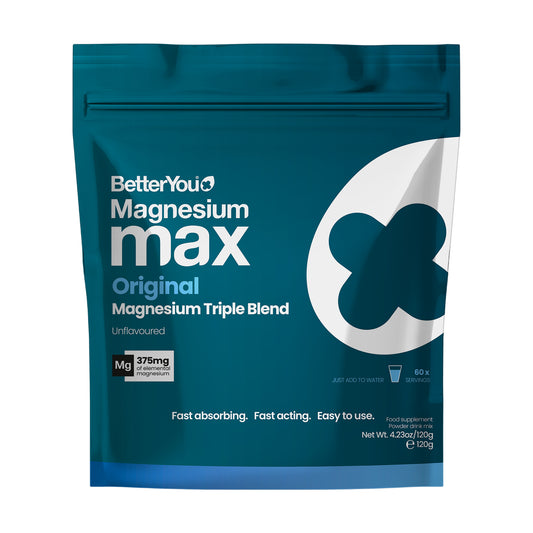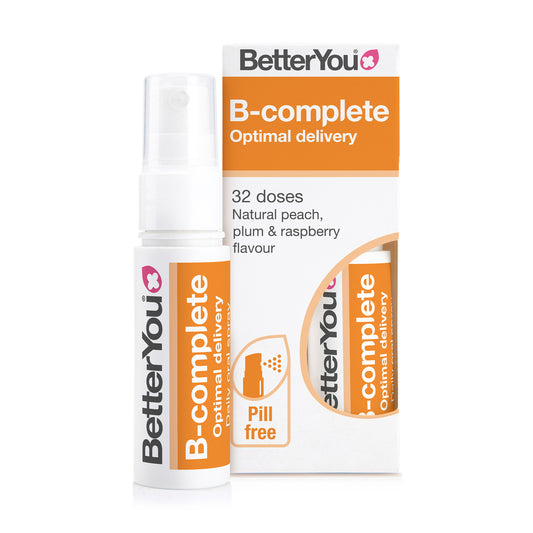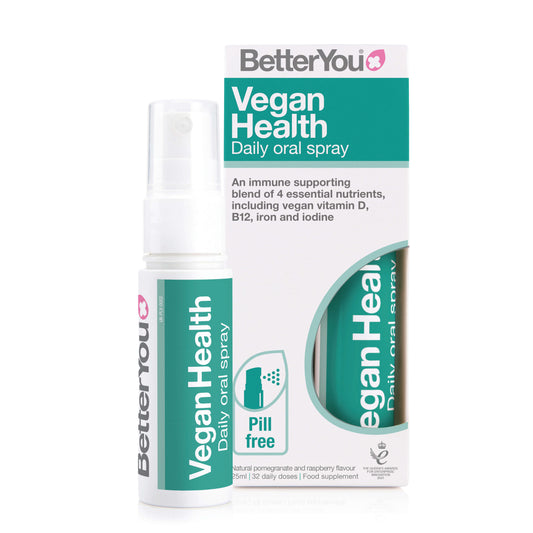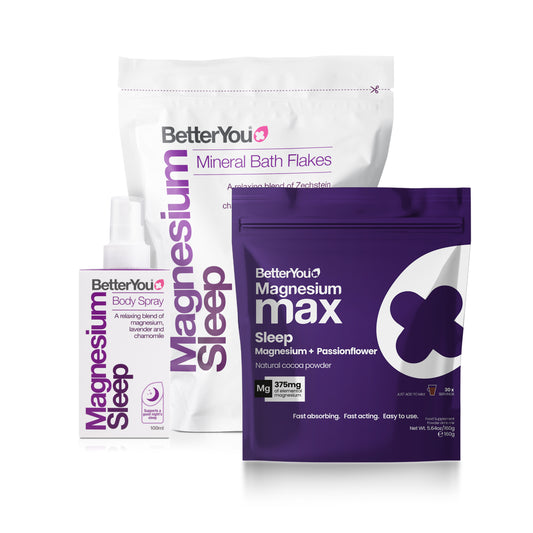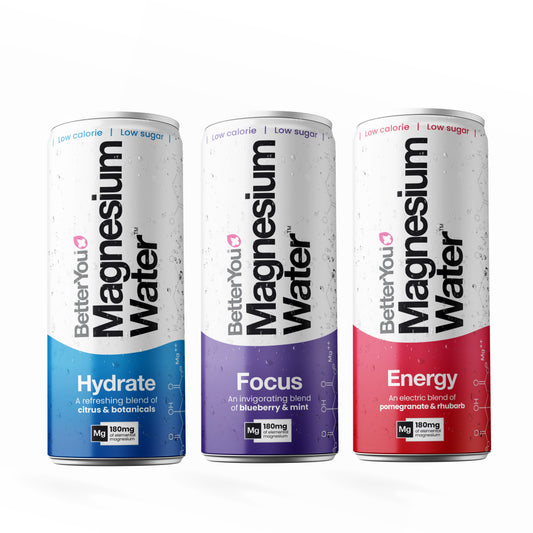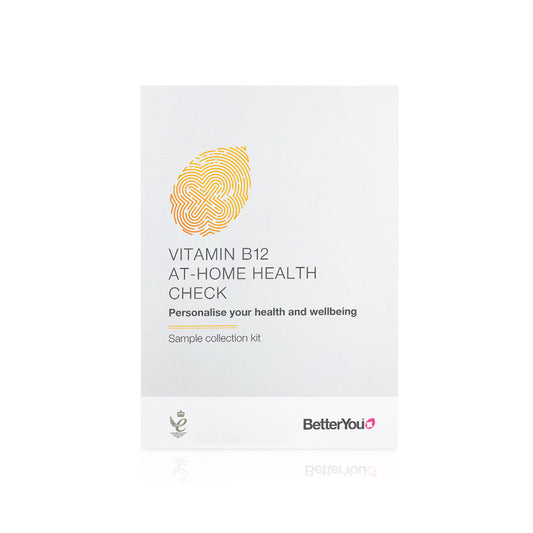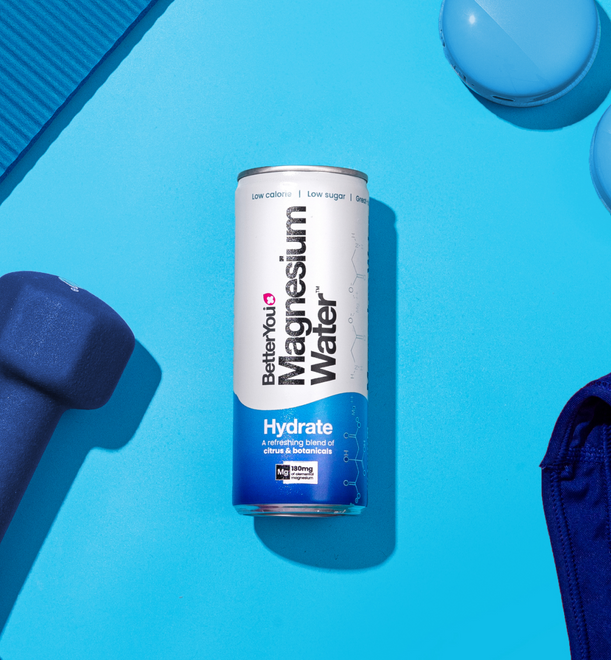When it comes to maintaining your vitamin and mineral intake at an optimal level, Vitamin B and Magnesium are two vital nutrients that can impact your energy levels, brain function and overall health.
While Vitamin B and Magnesium don’t need to be taken together to be effective, their health benefits can complement one another.
In this guide, we’ll explore the eight different vitamins in the Vitamin B family, how they support your body, and why it can be helpful to take Vitamin B12 and Magnesium together. Learn more about the advantages of Vitamin B and Magnesium, from producing red blood cells, strengthening bones, to supporting your nervous system and energy levels.
In this guide:
What are B Vitamins?
The Vitamin B family (also known as Vitamin B Complex) is made up of eight different types of Vitamin B. Each type of Vitamin B benefits the body in its own way, and they all have a number and name to refer to. Some are better known by their number or their name, rather than both.
These include:
- Vitamin B12
- Vitamin B9 (known as folate/folic acid)
- Vitamin B7 (known as biotin)
- Vitamin B6
- Vitamin B5 (known as pantothenic acid)
- Vitamin B3 (known as niacin)
- Vitamin B2
- Vitamin B1
Despite how important it is to our health, our bodies don’t produce Vitamin B naturally, so it’s important to get your optimal intake through your diet.
All eight B Vitamins play a role in supporting cell metabolism. They help your body produce energy, create new blood cells and support effective brain function, among other essential health benefits.
Browse our complete range of Vitamin B supplements
B Complex Vitamins
B Complex supplements make it easier for you to manage and increase your Vitamin B intake. They do this by combining all eight B Vitamins into a single tablet or oral spray.
B Vitamins are water soluble, which means they dissolve in water. This means your body is unable to store them like other minerals. Likewise, other fat-soluble vitamins such as Vitamin D and Vitamin A also need to be replenished every day to help maintain optimal levels.
One of the key advantages of B complex vitamins is that they can help deliver your full recommended daily allowance (RDA) of each B Vitamin. However, the dosage strength can depend on the supplement.
Who might take B Vitamins?
Everyone requires optimal levels of Vitamin B to support a healthy lifestyle. However, it may be even more important for certain groups of people to maintain their recommended Vitamin B intake, such as women who are pregnant or trying to conceive.
If you're pregnant, the NHS recommends to take 400 micrograms of folic acid (vitamin B9) every day until you’re 12 weeks pregnant. Our range of pregnancy supplements can help you get the vital nutrients you need to help support you and your little one throughout your pregnancy.
Shop our complete collection of pregnancy supplements
Can you take Vitamin B12 and Magnesium together?
Yes, it’s safe to take Vitamin B12 and Magnesium together. The benefit of supplementing B Vitamins and Magnesium together is that they don’t compete for absorption in the body. That’s why many multivitamin supplements combine them to help simplify how you keep up your vitamin intake.
The benefits of taking Vitamin B and Magnesium together
While Vitamin B and Magnesium don’t need each other to be effective, their advantages can overlap and complement one another. It’s one of the reasons why B12 and Magnesium make such a great team – as well as Iron supplements.
Some of the key benefits of taking Vitamin B and Magnesium in tandem include:
- Promoting normal function of the nervous system
- Supporting normal psychological function
- Boosting energy by contributing to your metabolism
- Reducing tiredness and fatigue
Some people find that taking Vitamin B6 with Magnesium can also help ease mood swings triggered by premenstrual syndrome (PMS).
Meanwhile, cobalt is a major part of Vitamin B12 benefits – so, if you get enough Vitamin B12, you'll also boost your cobalt intake.
Vitamin and Magnesium deficiencies are very common. If you find it easier to take several vitamins at the same time, supplementing Vitamin B and Magnesium together can help reduce the likelihood of becoming deficient.
Browse our range of Magnesium supplements

How do Magnesium and B Vitamins benefit the body?
Magnesium
Your body needs a range of key minerals and vitamins to remain healthy and function properly. Magnesium is one of them. Magnesium supports your body by:
- Fighting fatigue and restoring energy
- Strengthening your bones
- Relieving muscle tension
- Repairing muscle tissue after you've exercised or played sports
- Improving the quality of your sleep
- Helping to synthesise proteins
- Supporting heart health
B Vitamins
B Vitamins play a major role in your metabolism. Vitamin B complex helps your body to break down food and convert it into energy. As a result, it helps to combat tiredness and fatigue and allows the parts of your brain that facilitates concentration, learning and memory to function properly.
Other types of energy supplements work in harmony with Vitamin B to support a healthy lifestyle.
The table below shows the main benefits of each B vitamin.
|
B Vitamin |
Benefits |
|---|---|
|
B1 (thiamine) |
Helps organs (such as the brain and heart) to develop and function properly |
|
B2 (riboflavin) |
Helps the body absorb and break down fats and acts as an antioxidant |
|
B3 (niacin) |
Keeps skin healthy, helps with digestion and can lower cholesterol levels |
|
B5 (pantothenic acid) |
Vital for the health of the brain and nervous system |
|
B6 (pyridoxine) |
Helps:
|
|
B7 (biotin) |
Important for healthy hair and fingernails, and enables nerves to function properly |
|
B9 (folate/folic acid) |
Helps pregnant women reduce the risk of foetal deformities |
|
B12 (cobalamin) |
Helps:
|
Benefits of Vitamin B12
It’s important to maintain healthy levels of Vitamin B12 as it supports the body’s nervous system. Arguably one of the most important B Vitamins, it helps to support a range of other key functions too:
- It fights fatigue – Vitamin B12 helps your body produce new red blood cells. These cells carry oxygen around your body, delivering it to your brain, lungs, muscles and tissues. When your system isn’t getting enough oxygen this way, you begin to feel tired and fatigued.
- It helps with digestion – Another benefit of Vitamin B12 is that it enables your body to convert fats, proteins and carbohydrates into energy. Without it, your body wouldn’t be able to process these important nutrients and get them into your bloodstream.
- It can improve cognitive function – Your brain needs Vitamin B12 to support development and function. Vitamin B12 supplementation has been found to boost general mood and improve their cognitive performance.
Your Magnesium and Vitamin B intake
Eating a varied, balanced diet can help you get the right amount of Magnesium and Vitamin B that your body needs to be healthy.
At BetterYou, we always encourage a food-first approach to nutrition. However, we also know that it can sometimes be challenging to get all your nutrients from food sources alone. Some food sources don’t always provide the full daily recommended amount, so it can be helpful to increase your intake with supplements too.
Food sources to increase your Magnesium intake
Examples of Magnesium rich foods include:
- Brown rice
- Seafood
- Dark green vegetables (e.g. Spinach)
- Legumes (e.g. Lentils, split peas, tofu)
- Beans (e.g. Black, kidney, edamame)
- Nuts (e.g. Almonds, cashews, Brazil nuts)
- Seeds (e.g. Sunflower, sesame, pumpkin)
- Buckwheat
- Wholegrain cereals
Food sources to increase your Vitamin B intake
As with Magnesium, you can help boost your Vitamin B intake by eating a varied diet. Your body can produce biotin (B7) naturally, but none of the other seven vitamins.
Find out which foods to include in your daily diet to increase your intake of B Vitamins below:
B1 (thiamine)
- Red meat
- Peas
- Fresh fruits
- Eggs
- Sunflower seeds
- Fortified foods (rice, pasta, cereals, flour)
B2 (riboflavin)
- Red meat
- Poultry
- Eggs
- Milk and dairy products
- Vegetables (asparagus, peas, mushrooms, broccoli, Brussels sprouts, spinach)
- Wholegrain bread
B3 (niacin)
- Red meat
- Chicken
- Oily fish (salmon, mackerel)
- Eggs
- Milk and dairy products
- Potatoes
- Fortified foods (breakfast cereals, plant milk)
B5 (pantothenic acid)
- Red meat
- Poultry
- Fish
- Milk and dairy products
- Vegetables (mushrooms, broccoli, cauliflower, kale)
- Peanuts
- Wholegrains
B6 (pyridoxine)
- Poultry
- Fish
- Milk and dairy products
- Eggs
- Vegetables (carrots, spinach, sweet potatoes)
- Peanuts
- Wholegrains
B7 (biotin)
- Organ meats (liver, kidney)
- Salmon
- Egg yolk
- Nuts and seeds
- Yeast
B9 (folate/folic acid)
- Vegetables (broccoli, Brussels sprouts, cabbage, spinach, asparagus, peas)
- Fruits (bananas, oranges)
- Chickpeas
- Wholegrains
B12 (cobalamin)
- Red meat
- Chicken
- Fish
- Eggs
- Dairy products
- Fortified foods (breakfast cereals)
What happens if you don’t get enough Vitamin B12?
If you struggle to get enough B12 from your diet alone, this can lead to Vitamin B deficiency. The large size of its molecules makes it difficult for your digestive system to absorb Vitamin B12 effectively. Meanwhile, feeling tired, suffering with ill health or having a poor diet can also affect how effectively your body breaks down B12 and delivers it to your bloodstream.
Fast and convenient, boosting your intake with effective supplements can help you meet your recommended daily intake. That way, you can appreciate the benefits of this essential vitamin.
Our fast absorbing Vitamin B12 Oral Spray can help deliver a high-strength dose of Vitamin B12 right where you need it most. Simply spray it directly into your inner cheek and let it go to work.
Some people may find B12 tablets and capsules difficult to swallow or digest. Our fast acting vitamin oral sprays deliver small droplets of B12 to your system immediately via your bloodstream.
How much Magnesium should you take?
The recommended daily Magnesium dosage can vary depending on your age and sex. Adult men aged 19–64 are advised against taking more than 420 mg, while adult women aged 19–64 should only take up to 320 mg. Children are advised to take lower doses, depending on how old they are.
These guidelines only apply to oral supplements such as tablets and capsules. Transdermal Magnesium supplements, like Magnesium oil, have no upper limit.
They are safe to use in whatever dosage you prefer as they are being absorbed through the skin.
At BetterYou, our Magnesium supplements are made from the purest form of Magnesium chloride known as Zechstein Magnesium. Sourced from the Zechstein Sea, its pure form encourages optimal absorption.
Supplementing with transdermal Magnesium can also help your body to absorb and use minerals such as calcium, phosphorus and potassium.
Find out more about Magnesium dosages and how to supplement safely with our guide
How much Vitamin B should you take?
Each of the eight B Vitamins has its own recommended daily dosage. It’s important to follow the nutrient reference value guidelines for dosage requirements.
Vitamin B dosage can vary depending on factors such as:
- Your gender
- Your age
- Your diet—i.e. If you’re vegan or vegetarian
- Whether you’re pregnant
Recommended daily dosages
The recommended daily dosages of vitamin B set by Public Health England are as follows:
Adults
|
B Vitamin |
Recommended daily dosage (mg = milligrams mcg = micrograms) |
|||||
|---|---|---|---|---|---|---|
|
Men |
Women |
|||||
|
19–64 |
65–74 |
75+ |
19–64 |
65–74 |
75+ |
|
|
B1 (thiamine) |
1.0 mg |
0.9 mg |
0.9 mg |
0.8 mg |
0.8 mg |
0.7 mg |
|
B2 (riboflavin) |
1.3 mg |
1.1 mg |
||||
|
B3 (niacin) |
16.5 mg |
15.5 mg |
15.1 mg |
13.2 mg |
12.6 mg |
12.1 mg |
|
B5 (pantothenic acid)* |
– |
– |
||||
|
B6 (pyridoxine) |
1.4 mg |
1.2 mg |
||||
|
B7 (biotin)* |
– |
– |
||||
|
B9 (folate/folic acid) |
200 mcg |
200 mcg |
||||
|
B12 (cobalamin) |
1.5 mg |
1.5 mg |
||||
Older children and teenagers (age 7–18)
|
B Vitamin |
Recommended daily dosage (mg = milligrams mcg = micrograms) |
|||||
|---|---|---|---|---|---|---|
|
Male |
Female |
|||||
|
7–10 |
11–14 |
15–18 |
7–10 |
11–14 |
15–18 |
|
|
B1 (thiamine) |
0.7 mg |
1.0 mg |
1.0 mg |
0.7 mg |
0.8 mg |
0.8 mg |
|
B2 (riboflavin) |
1.0 mg |
1.2 mg |
1.3 mg |
1.0 mg |
1.1 mg |
1.1 mg |
|
B3 (niacin) |
12.0 mg |
16.5 mg |
16.5 mg |
11.2 mg |
13.2 mg |
13.2 mg |
|
B5 (pantothenic acid)* |
– |
– |
||||
|
B6 (pyridoxine) |
1.0 mg |
1.2 mg |
1.5 mg |
1.0 mg |
1.0 mg |
1.2 mg |
|
B7 (biotin)* |
– |
– |
||||
|
B9 (folate/folic acid) |
150 mcg |
200 mcg |
200 mcg |
150 mcg |
200 mcg |
200 mcg |
|
B12 (cobalamin) |
1.0 mg |
1.2 mg |
1.5 mg |
1.0 mg |
1.2 mg |
1.5 mg |
Younger children (age 1–6)
|
B Vitamin |
Recommended daily dosage (mg = milligrams mcg = micrograms) |
|||||
|---|---|---|---|---|---|---|
|
Male |
Female |
|||||
|
1 |
2–3 |
4–6 |
1 |
2–3 |
4–6 |
|
|
B1 (thiamine) |
0.3 mg |
0.4 mg |
0.6 mg |
0.3 mg |
0.4 mg |
0.6 mg |
|
B2 (riboflavin) |
0.6 mg |
0.6 mg |
0.8 mg |
0.6 mg |
0.6 mg |
0.8 mg |
|
B3 (niacin) |
5.0 mg |
7.2 mg |
9.8 mg |
4.7 mg |
6.6 mg |
9.1 mg |
|
B5 (pantothenic acid)* |
– |
– |
||||
|
B6 (pyridoxine) |
0.7 mg |
0.7 mg |
0.9 mg |
0.7 mg |
0.7 mg |
0.9 mg |
|
B7 (biotin)* |
– |
– |
||||
|
B9 (folate/folic acid) |
70 mcg |
70 mcg |
100 mcg |
70 mcg |
70 mcg |
100 mcg |
|
B12 (cobalamin) |
0.5 mg |
0.5 mg |
0.8 mg |
0.5 mg |
0.5 mg |
0.8 mg |
*Pantothenic acid and biotin are found in many foods, so as long as you eat a varied and balanced diet you should get all you need.
B Vitamin supplements—maximum recommended dosages
If you take Vitamin B oral supplements, it’s important to know the maximum recommended dosage. Some supplements provide more than your full recommended daily allowance (RDA).
No matter what supplements you take, you should always read the product labels to find out the maximum recommended dosage for your age and sex. Knowing the daily limit can help you enjoy optimal health benefits, as well as stay within the recommended safe limits.
The table below shows the maximum recommended dosages for each B Vitamin to be beneficial.
|
B Vitamin |
Maximum recommended dosage |
|---|---|
|
B1 (thiamine) |
100 mg |
|
B2 (riboflavin) |
40 mg |
|
B3 (niacin) |
17 mg |
|
B5 (pantothenic acid) |
200 mg |
|
B6 (pyridoxine) |
10 mg |
|
B7 (biotin) |
0.9 mg |
|
B9 (folate/folic acid) |
1 mg |
|
B12 (cobalamin) |
2 mg |
Not sure whether you could be low in Vitamin B? Check your levels easily from the comfort of your own home by taking our simple at-home test. We’ll send you accurate results in up to five days, as well as a free supplement to get you started.
A better way to a BetterYou
At BetterYou, we appreciate the diversity of modern life. Between food production, our environment and busy schedules, our lifestyles can make it harder to get essential nutrients from diet alone. As experts in fast-acting, effective supplements, we’re here to help.
We focus on essential nutrients that help support your health and wellbeing, so you can feel your best. Combining the most bioavailable forms of ingredients with innovative delivery methods like oral sprays and transdermal oils, our products deliver quick and efficient nutrition where you need it most.
Whether you’re looking to boost your immunity, energy levels or help nourish your hair, skin and nails—find a better way to a BetterYou today. We’re available in major retailers, including Tesco, Holland & Barrett, and Boots. You can also find us online and on Amazon, making it easy to find the products you need.
